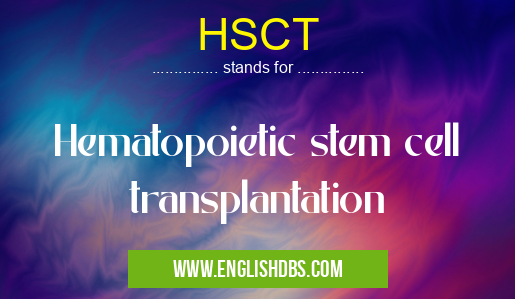What does HSCT mean in PHYSIOLOGY
HSCT is used to treat various blood-related diseases, such as:

HSCT meaning in Physiology in Medical
HSCT mostly used in an acronym Physiology in Category Medical that means Hematopoietic stem cell transplantation
Shorthand: HSCT,
Full Form: Hematopoietic stem cell transplantation
For more information of "Hematopoietic stem cell transplantation", see the section below.
» Medical » Physiology
HSCT Meaning in Medical
- Leukemia
- Lymphoma
- Hodgkin's disease
- Multiple myeloma
- Sickle cell anemia
- Thalassemia
HSCT Full Form
- H: Hematopoietic
- S: Stem
- C: Cell
- T: Transplantation
What Does HSCT Stand for?
HSCT stands for Hematopoietic stem cell transplantation, a procedure that:
- Involves: Transplantation of healthy stem cells into a patient's body
- Aims to: Restore or replace damaged or diseased bone marrow
- Treats: Various blood-related diseases
Essential Questions and Answers on Hematopoietic stem cell transplantation in "MEDICAL»PHYSIOLOGY"
What is HSCT?
Hematopoietic stem cell transplantation (HSCT) is a medical procedure that involves the transplantation of healthy stem cells into a patient whose own stem cells are damaged or have been destroyed by disease or treatment. The stem cells are typically taken from a donor and then infused into the patient's bloodstream.
What are the different types of HSCT?
There are two main types of HSCT: autologous and allogeneic. In autologous HSCT, the patient's own stem cells are collected and then re-infused after they have been treated to remove any damaged cells. In allogeneic HSCT, stem cells are taken from a donor and then infused into the patient.
Who is eligible for HSCT?
HSCT is typically used to treat patients with certain types of cancer, such as leukemia, lymphoma, and myeloma. It can also be used to treat patients with severe immune disorders or genetic diseases.
What are the risks of HSCT?
HSCT is a complex procedure with a number of potential risks, including infection, graft-versus-host disease (GVHD), and organ damage. The risks of HSCT vary depending on the type of transplant and the patient's underlying health condition.
What is the success rate of HSCT?
The success rate of HSCT varies depending on the type of transplant and the patient's underlying health condition. In general, the success rate is higher for autologous HSCT than for allogeneic HSCT.
Final Words: HSCT is a complex and demanding medical procedure that requires specialized expertise and resources. It has the potential to cure or significantly improve the prognosis of patients with severe blood-related diseases. Ongoing research and advancements in HSCT techniques aim to enhance its efficacy and safety, offering hope to individuals facing these life-threatening conditions.
